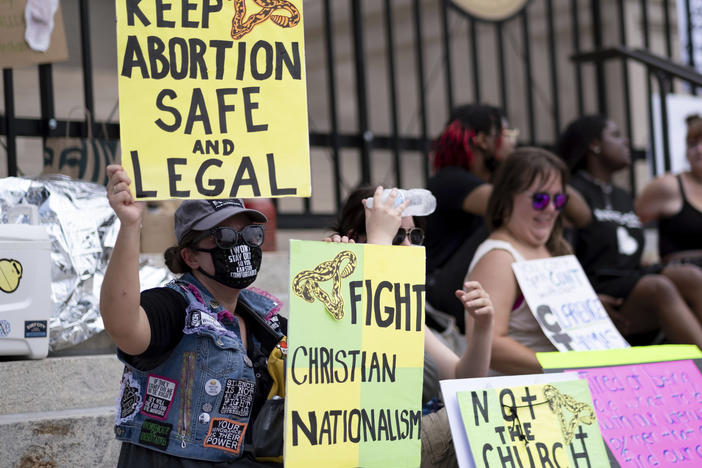Football Fridays Game of the week | Playoffs Rd 2- Lowndes at Buford - At 7:30 P.M.
Section Branding
Header Content
As states ban abortion, the Texas bounty law offers a way to survive legal challenges
Primary Content
After the Supreme Court overturned Roe v. Wade, abortion rights opponents in state governments quickly moved to ban the procedure, while abortion rights supporters quickly challenged the bans in court.
The 1973 Supreme Court case established a constitutional right to abortion. Now, abortion rights will be left to states to decide, with years of litigation expected in state courts.
One state abortion ban that has already been tested in courts — and so far prevailed — is a Texas law known as Senate Bill 8.
It took effect last fall and relies not on the government but on private citizens to enforce. Opponents have couched it in terms like the "vigilante abortion law" or "bounty hunter law."
That's because the law incentivizes citizens with a cash "bounty" if they succeed in suing anyone who has helped a person get an illegal abortion. Texas inspired Idaho and Oklahoma to follow suit with this type of enforcement mechanism.
Most states that want to ban abortion have so far not taken this approach, opting instead to enforce a ban through the criminal justice system. Two dozen states have now banned abortion or will soon.
Still, for many abortion opponents, Texas-style laws remain an appealing strategy in the movement's fight to enforce the bans, said Mary Ziegler, a law professor at University of California, Davis, and the author of the new book Dollars for Life: The Anti-Abortion Movement and the Fall of the Republican Establishment.
"They're still an important tool because of the limits of criminal law," Ziegler said.
The anti-abortion advocates who developed the Texas law, she said, thought criminal laws in comparison offered fewer ways to survive court challenges and too much discretion to the more progressive prosecutors who might fail to enforce the law.
"For example, if you want to stop people from traveling out of state to get an abortion, or you want to try to prosecute doctors from blue states for performing abortions on people in red states, there are going to be serious constitutional questions there," she said, including potential violations of the constitutional right to travel. "The same isn't true with these civil-style laws."
How SB 8 works
SB 8 bans abortions following the detection of a fetal pulse — in other words, after about six weeks — which is often well before many women even know they are pregnant. The law makes no exceptions for rape or incest.
It allows private citizens to file a civil lawsuit against anyone who knowingly "aids or abets" an abortion. If successful, the law instructs courts to award plaintiffs at least $10,000 in damages from defendants.
Doctors and abortion providers, drivers who provide transportation to a clinic, or those who help fund an abortion, for example, could all be liable to incur legal fees if they are sued. People who receive an abortion cannot be sued under the law.
The threat of lawsuits has so far been enough to discourage providers from performing abortions in the state. In the month after the law took effect, the number of abortions in Texas dropped by half compared to the same month the previous year, according to a study by the University of Texas at Austin.
Abortion rights opponents champion the law as a successful model for other Republican-led states.
"We are actually, in Texas, getting a glimpse of what a post-Roe world will look like," John Seago, the legislative director for the anti-abortion rights organization Texas Right to Life, told NPR in February, before the repeal of Roe.
He said Texas is prepared to support women in "an abortion-free state" through a state program that provides services including adoption agencies and maternity homes. The program was allotted $100 million in funding last year. State Democrats have decried the lack of oversight on the program, which lacks data about what it has accomplished.
Texas Right to Life, which is the state's largest anti-abortion group, set up a "whistleblower" website that allows people to send anonymous tips about suspected violators of the law. But after multiple attempts to secure a web hosting platform, the group has apparently failed to find a permanent home for the reporting tool.
Since many doctors and abortion providers have complied with SB 8, that's left few opportunities to test the law's civil enforcement mechanism.
But a few people have tried. After Alan Braid, a San Antonio doctor, revealed in a Washington Post op-ed that he violated the ban after it went into effect, three people sued him. That litigation is still ongoing.
Digital privacy experts warn of other concerns for women in Texas seeking abortions. Internet search histories and apps that track reproductive health data and locations are among the tools that store data that could reveal a person's intent to get an abortion. Third-party companies that collect and sell that user data could allow anyone who purchases a dataset access to information that they can then use to report an abortion.
A "bounty" law has historical parallels
The first-of-its-kind Texas law is not so novel, historians say. The bounty mechanism draws comparisons to the Fugitive Slave Law of 1850, the historian and author of two books on the subject Richard Blackett previously told NPR.
Under the law, the U.S. government offered a cash bounty to people who captured and returned fugitives from slavery. If you helped an enslaved person escape, you could be dealt a hefty fine. Widespread opposition to the law in the form of protests eventually made it too difficult to enforce.
Ziegler says it's a helpful comparison when thinking about the current divisive moment in America. She expects the different abortion laws will be tested and hashed out in the courts as anti-abortion states wait and see what sticks.
Challenges to SB 8 have so far failed. The Supreme Court refused to block the law as it prepared to rule on a Mississippi case that determined Roe's fate. (Idaho's law is on hold while a lawsuit makes its way through the Idaho Supreme Court.)
In the anti-abortion movement, Ziegler said, criminal laws are the current preferred solution. Indeed, SB 8 is only one of multiple laws restricting abortion in Texas, including a ban dating to 1925 and a 2021 "trigger" law set to be enforced later this summer.
But "bounty" abortion laws will likely be on the books for some time, she added: "SB 8 style solutions, with this Supreme Court, are not going to be meaningfully challenged I don't think."
Copyright 2022 NPR. To see more, visit https://www.npr.org.
Bottom Content




